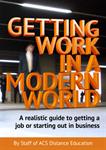 Want to be a Careers Counsellor?
Want to be a Careers Counsellor?Are you interested in helping people to make important decisions about their career?
Would you like to increase your own job and career opportunities by increasing your knowledge and skills in careers counselling?
Then this is the course for you!
Study -
- careers counselling
- employment opportunities and options
- careers counselling resources
- careers services
- counselling skills
- conducting a careers counselling interview
- offering careers counselling to adults
- job prospecting
- nurturing a career
And through all of the course, you will have the support of a highly qualified, experienced and friendly tutor.
Careers Counselling is a mainly verbal process, where the counsellor and client are in a collaborative and dynamic relationship, focussing on identifying and acting on the goals of the client. The counsellor uses their repertoire of techniques and processes, to help the counselling client come to an understanding of the options available.
Lesson Structure
There are 10 lessons in this course:
-
Introduction ...Scope & Nature of the Industry
-
Definitions: career, careers counselling, counselling
-
Broad employment options
-
Services offered in the employment industry
-
Assumptions about career counselling practices
-
Cross cultural careers counselling
-
Nature of Careers ...What is a career, what makes it successful?
-
Introduction
-
Elements of career building and job seeking
-
Factors contributing to career success
-
Realistic expectations
-
Range of options
-
Persistence
-
Case study
-
Careers Advice Resources ...Brochures, Publications, Web Sites
-
Employer considerations: qualifications, experience, personality, age, adaptability, productivity, etc
-
Case study
-
Career Services ....Where can people get help (Social Services, Work Experience, Education)
-
Career counselling services
-
Careers and vocational guidance
-
Vocational planning
-
Setting goals
-
Job seeking support
-
Job seeking strategies
-
Other services
-
Developing Counselling Skills
-
Key areas for career counselling
-
Helping clients focus on reality
-
Helping clients identify opportunities
-
Helping clients consider all elements
-
Overcoming resistance from clients
-
Listening skills
-
Questioning skills
-
Problem solving skills
-
Essential reality checks
-
Improving client's predictive ability
-
Conducting a Counselling Session
-
Why people come to a career counsellor
-
Strategies to develop trust
-
A career counselling session
-
Individuals who know the job they want
-
Psychometric testing for individuals still choosing a career
-
Types of psychological tests that may be used
-
Referring people elsewhere
-
Counselling Students and School Leavers (with little work experience)
-
Understanding youth
-
Career counselling for adolescents
-
Assisting indecisive teenagers
-
Career counselling for students
-
Giving advice on study
-
Choosing a course
-
Workshops for students
-
Workshops for university students
-
Resources for counselling students
-
Counselling Adults (inexperienced or facing career change)
-
Identifying adult needs
-
The training program
-
Advice and support during job hunting
-
Course of action
-
Career changing
-
Easiest paths to career change
-
Challenging path to career change
-
Starting a business
-
Case study
-
Writing a business plan
-
Job Prospecting
-
Ways of finding work
-
Supporting client's decisions
-
Prospecting for work
-
Tips on getting a job
-
Writing resumes (CVs)
-
Preparing for a job interview
-
Nurturing and growing a career once it has started
-
Getting a job is only the first step in a career
-
Self-management for business-people
-
Marketing and pricing
-
Case study
-
Advising clients about career advancement
Aims
-
Identification of people and organisations which offer career advice or support and the services they offer.
-
Improved ability to distinguish successful from unsuccessful careers, and to prepare for anticipated changes in the workplace.
-
Skills that will enhance your ability to guide others in the establishment or development of a career.
-
Ability to plan and execute an effective Counselling Session.
-
Understanding and strategies for dealing with the needs of inexperienced young people.
-
Identifying and meeting the needs of inexperienced adults or those facing career change.
-
Understanding of how and where to find employment in the job market.
-
Appreciation of the need to nurture and grow a career and plan for change.
What You Will Do
-
Undertake research into the scope and nature of employment services and service providers in your region or locality.
-
Research a career area to identify the kind of work involved, requirements, who offers it, trends etc.
-
Role play a counselling session to practise and evaluate your skills in helping a client with an issue.
-
Conduct research to improve your understanding of what careers counselling entails.
-
Plan a careers counselling session, including the session goal, timeframe, and anticipated issues.
-
Discuss career concerns with young people who are leaving or have recently left secondary school.
-
Discuss with adults their experiences of career change.
-
Plan strategies to assist young and adult clients deal with common and important identified issues.
 Sample Course Notes - The Best Careers Advice is to be Flexible
Sample Course Notes - The Best Careers Advice is to be Flexible
In the past, there were fewer career choices, and fewer changes in the workplace. You could commence a career in one thing and stay in the same job for decades, if not your entire working life. Today's world is different, and tomorrows is likely to be even more different.
People can still make choices about the broad disciplines or industries they want to work in; but it is an illusion to think that the tasks involved in that industry, and the jobs on offer, will not change and keep changing.
One way of looking at your work choices is to begin by thinking about what you would most enjoy and be suited to working with. There are three broad groups of jobs –
- Ones where you are mostly interacting with inanimate things – your focus is on a computer, a machine, something you are building or creating, plants, research, a laboratory, etc.
- Ones where you are mostly focused on animals – farm work, veterinary work, dog handler, wildlife photographer, etc.
- Ones where you are mostly focused on people – public health, law and order, education, human services, etc.
Most people will have a natural preference for one of these three categories. Some people love to make things from inanimate objects more than spend time interacting with other people. Some might say they prefer the company of animals to people. For others, the first thing they’ll say when asked about their work preferences is that they want to work with people.
As you go through your life it may become increasingly clearer which type of work you are most suited to you (although this may change throughout your life). This book focuses on the opportunities that exist for working with people. Of course, all jobs require some amount of interaction with others - it’s more a case of the degree to which a particular role involves dealing with other people.
Whether you are quite sure about the roles that are of most interest to you, or you are still undecided but know that whatever you do it must involve interacting with other people, then this book will be of value to you. One thing is for sure, if you are one of those interested in working primarily with people then there are many career opportunities available to you, some of which you probably haven’t even considered or weren’t aware of. Some career fields that often quickly come to mind include psychology, counselling, teaching, medicine, nursing and human resources, but there are many more. Working with people will give you limitless opportunities and a diverse range of skills which can be applied in many different careers.
Does this mean Training, Study and Experience will be Redundant?
Definitely not.
The things you learn and experience today will always be a foundation for your future; but studying for a job is not the same as it used to be.
Once you could learn to use a tool or machine, and use the same tool or machine all of your working life. Today the tools change, the machines change, and even the jobs they performed may be replaced by other jobs. Some things don't change though. The laws of physics that make tools and machines work, will remain unchanged. The motor skills, materials knowledge and creativity used to create or update tools and machines don't change.
Similarly, jobs that involve working with people may change, but the need to understand psychology and to communicate with people, will remain constant.
Courses that are good may teach you specific skills that could go out of date; but embedded in that teaching should be a whole range of fundamental skills and knowledge that will underpin your capacity to work in different jobs, well into the future -even jobs that have not yet been conceived.
Careers advisors today need to recognise how the world is changing fast, and unpredictably.
They need to advise people to think ahead; and get out of any sort of mindset that they will only need to get through a job interview and they will have a job for life.
This is the course for you if you are -
- interested in working in careers counselling or wish to increase your knowledge in the field.
- a teacher
- a teaching assistant
- a youth worker
- a social worker
- a community worker
- an educational worker
- a life coach counsellor
- and for anyone interested in becoming a careers counsellor
What do our students think?
ACS student comment: "I have really improved my knowledge in this field. It has also given me the confidence to start my own small business in the field. The presentation allowed the course to become very accessible and practical. Even for those with a lower level in English like me." Charles Mboning - Careers Counselling course.
I have done several counselling courses in the past and the coaching course fitted in well with the learning experiences I had encountered previously. The reading material was detailed and interesting and the feedback was detailed and constructive. Sarah, Life Coaching
If you want to become a careers counsellor
If you want a satisfying and rewarding career helping people with their career choice
Then this is the course for you! Enrol now and start learning more about careers counselling.
